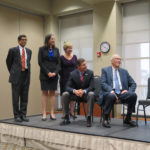
Hispanic Catholics dance through downtown Columbus Junction during a 2023 Our Lady of Guadalupe celebration.
By Marti Jewell and Dan Ebener
The Catholic Messenger
Hispanic culture has become very much a part of the Catholic faith with its vibrant music and Latin cuisine. However, enjoying new foods and good music is just the beginning of getting to know people of other cultures. We also need to develop a deep understanding and respect for one another. “Many cultures, one faith” was a guiding mantra in the 19 Hispanic parishes that we studied for the Catholic Leadership Institute’s diversity study.
Catholics of every culture share a love for their faith, a desire for good liturgy, good homilies and faith formation. How this plays out is deeply rooted in our cultural heritage. These expressions of faith flow from heritages rooted in many different Hispanic countries. For U.S. born Hispanics, this also includes the American experience of faith and religion. As one pastor told us, each cultural community “has its own needs, gifts, strengths, and so you lean into that and let that grow.” Here is some of what we heard about the riches and challenges for Hispanic parishes.
We begin with the Sunday experience. Mass is central to the Catholic faith but do we come together as one community or as two separate communities in one parish? Is liturgy bilingual? Only in English? If Mass is offered in Spanish, is it offered at a time that is convenient to that population? Reception of the sacraments is particularly important to the Hispanic community, especially sacraments of initiation. The challenge in many parishes is providing sacramental preparation in Spanish as well as English.
Integrating newcomers into the routines of parish life is important. Parish customs, such as singing during liturgy may surprise some newcomers. It is a common practice here but confusing, perhaps even disrespectful, for some people newly arrived. Participants in our study also emphasized the important Hispanic traditions such as flowers at Mary’s altar, posadas and quinceaneras, in parish life.
Repeatedly, we heard about the deep, familial spirituality that is a feature of the Hispanic culture, a spirituality rooted in the extended family. Another unique point of emphasis among Hispanic Catholics is a devotional piety, supported by sacramentals — visible reminders of the faith. People spoke of an abiding devotion to the Blessed Mother, though under a variety of titles. We know about Our Lady of Guadalupe but have we heard of Brazil’s Our Lady of Aparecida?
Another distinguishing characteristic of Hispanic Catholics is a strong dependence upon the pastor. Hispanic participants in our study lamented the fact that the Church has a scarcity of pastors (and deacons) who are Hispanic or at least clergy who understand Latino traditions. They especially called out the need for clergy who are bilingual.
Vibrant parishes show a capacity for welcoming the immigrants, especially those who are recent arrivals who may not understand the prevailing culture of our parishes. Pastors told us the most important thing is to listen —intentionally. Be present. Learn the stories, journeys and histories of the people. What we share here is just a taste of the challenges and the richness of the Hispanic community. We invite you to explore its possibilities in your parish. We are many cultures, one faith, and rich in our diversity.
(Marti Jewell, associate professor emerita, is a professor, author and researcher of pastoral leadership. Dan Ebener is a leadership professor for the Master of Organizational Leadership program at St. Ambrose University in Davenport and director of Parish Planning for the Diocese of Davenport.)











